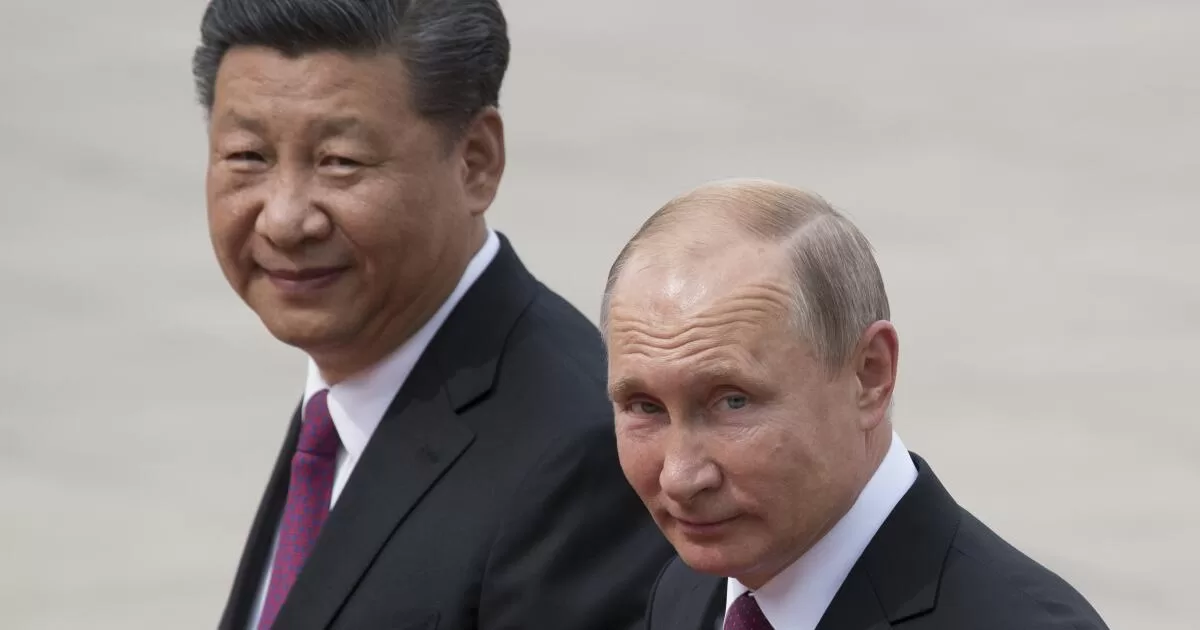Russian President Vladimir Putin is embarking on his first foreign trip since his splashy inauguration to a fifth term in office, and his destination is no surprise: China.
The two-day state visit beginning Thursday is expected to be heavy on pomp and ceremony, with effusive toasts and carefully choreographed gestures of friendship and mutual respect.
But status matters, and Putin is clearly the junior partner to Chinese President Xi Jinping. As the Economist magazine put it after the visit was announced: “Vladimir Putin will meet his big brother in Beijing.”
Despite inherent lopsidedness in their dealings — China is Russia’s principal trade partner, while Beijing’s largest export market is the United States — Xi has gone out of his way to imbue the visit with a sense of historic significance.
The two leaders are expected to sign a joint declaration after their talks, and there will be a gala celebration marking 75 years of diplomatic ties between the two countries.
Putin — known for sometimes staging haughty keep-them-waiting displays when other leaders make the trek to the Kremlin — has taken a notably deferential tone toward his host.
In a pre-trip interview with China’s official Xinhua news agency, he expressed admiration for elements of Chinese culture, including martial arts and philosophy.
“Our peoples are bound by a long and strong tradition of friendship and cooperation,” he told Xinhua.
Putin’s expressions of gratitude are well-warranted. Since Russia’s February 2022 full-scale invasion of Ukraine, Xi has propped up his Russian counterpart in a variety of crucial ways.
China has helped Putin weather wartime Western sanctions, extending a particular lifeline to Russia’s lucrative oil and gas industry. Over the last two-plus years, Russia’s energy exports to China have easily offset the rupture in what had been Moscow’s cozy prewar energy relationship with Europe.
In many ways, the strategic relationship serves both Beijing and Moscow — and represents, in the view of many analysts, two autocrats’ unified challenge to the West.
“China and Russia are forging a partnership increasingly reminiscent of a great power alliance,” military intelligence analyst Chels Michta wrote in a commentary this week for the Center for European Policy Analysis.
But while Xi and Putin share a disdain for a U.S.-led world order, their interests are not identical. And the Ukraine war is at times a complicating factor.
China does not provide Russia with weaponry. But the Biden administration has prodded Xi’s government over its sale to Russia of so-called dual-use items — components such as machine tools, microelectronics and rocket propellant, which have civilian and military uses.
That came up last month when U.S. Secretary of State Antony J. Blinken visited Beijing and chided China for “powering Russia’s brutal war of aggression against Ukraine.”
Washington has also said it will take a harder line against Chinese-based financial institutions and firms that help Moscow circumvent wartime restrictions, warning of secondary sanctions against them.
Even as China publicly professes neutrality on Ukraine, many observers believe Putin was emboldened in his war aims by a joint pact struck with Beijing days before the invasion, proclaiming a “no-limits” partnership.
In the course of the Ukraine war, however, some points of friction have emerged. China has been made uneasy by Putin’s occasional strident nuclear threats, the latest of which came this month when the Kremlin announced it would conduct exercises simulating the use of tactical — or battlefield — nuclear weapons near Ukraine.
In a variety of international settings — most recently during a high-profile European tour last week — Xi has expressed hopes for peace in Ukraine, even as he has refused to condemn Russia’s ongoing attempt to batter its neighbor into submission.
Ukraine has been careful not to publicly denigrate China’s peace proposals — a 12-point plan unveiled more than a year ago, followed by additional “principles” set forth last month — but the government in Kyiv and its allies believe that if Beijing wanted to genuinely play the conciliator, it could use its influence to rein in Putin.
On the eve of the visit, Putin praised the Chinese proposals, which were tepidly received elsewhere, as “realistic and constructive.” The Russian leader also draws frequent parallels between his contention that Ukraine rightfully belongs to Russia and China’s claim to Taiwan.
During last week’s European tour, Xi joined France’s President Emmanuel Macron in calling for a “global truce” during the Summer Olympic Games in Paris — one that would theoretically apply in Ukraine, where the tempo of fighting has been intensifying.
Ukrainian military officials acknowledge that for the moment at least, Russia has battlefield momentum on its side, making new territorial seizures in Ukraine’s northeast and notching steady incremental gains on the eastern front lines.
Despite elaborate displays of Sino-Russian friendship, in some parts of the world the two see each other as rivals rather than partners.
Xi is well aware that Putin’s international isolation leaves him at a disadvantage, and in some venues, such as Eastern Europe, that gives China greater economic latitude.
“The full-scale invasion of Ukraine is accelerating the process of China edging out Russia from Central and Eastern Europe,” wrote analyst Dimitar Bechev of the Carnegie Russia Eurasia Center after Xi’s visit last week to Hungary and Serbia.
Putin, he wrote, “has become toxic in a way that the Chinese leadership is not.”
